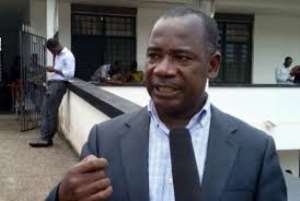
Accra, April 27, GNA - Professor Emmanuel Debrah, the former Head of Political Science Department at the University of Ghana, has said the Nkrumaist tradition, which formed the basis of the Ghanaian independence was dwindling by the years.
Professor Debrah said the tradition was diminishing because it had developed many branches reflecting in the formation of various political parties in the country such as the Conventions People's Party, Progressive Peoples Party, People's National Convention, United Front Party, and Great Consolidated People's Party.
He was speaking to the Ghana News Agency on the sidelines of a lecture series by the Political Science Department of the University of Ghana in collaboration with the Konrad Adenauer Stiftung Foundation under the theme: 'Analysis of 2016 Presidential and Parliamentary Elections'.
Professor Debrah said there were three political traditions in Ghana: the Dankwa-Busia-Dombo, the Nkrumaist and the Rawlings traditions saying, the Rawlings tradition was the blending of the Dankwa-Busia-Dombo and the Nkrumaist traditions.
He said the New Patriotic Party reflected the Dankwa-Busia-Dombo tradition, while the National Democratic Congress reflected the Rawlings traditions and the Nkrumaist tradition seen in the other political parties reflecting Nkrumah's ideologies.
Professor Debrah who is also the Acting Head of the History Department said political parties were relevant for the thriving in any democratic dispensation looking at the critical roles they played in educating electorates saying 'We cannot have democracy without political parties'.
He said partisan loyalty had a heavy presence in the Ghanaian politics and was reflected during the 2016 election in the country where many Ghanaians were identified with political parties through a research conducted by the department in its post-election research.
The Professor in Political Science said: 'Partisanship becomes a salient part in influencing the way the citizenry votes,' adding that the voting trends in the Volta and Ashanti regions had become consistent due to political socialisation.
On his part, Dr Bossman Asare, the Head of the Political Science Department speaking on the topic: 'Political party mobilisation,' said political parties believed that mobilising people for political activities was their core mandate and therefore had channeled energy to perform that task.
Dr Bossman said Ghanaians were becoming politically conscious because of their massive engagement in political activities such as political rallies.
He said political parties should therefore explain their ideologies to Ghanaians to help in appreciating exactly what they would be committing to saying 'the education function of political parties must be championed'.
Dr Bossman said political parties must become the vehicles of political education for the Ghanaian populace stating, 'Political parties must have a programme to educate Ghanaians'.
He said, it was revealed from the research that few Ghanaians contributed financially to political parties while most of people received money from them thereby influencing voter apathy, which he said were not in good taste.
GNA
By Julius K. Satsi, GNA




 MASLOC former boss sentenced to 10 years in prison with hard labour
MASLOC former boss sentenced to 10 years in prison with hard labour
 Convert National Cathedral site to tourist centre — Spio-Garbrah to govt
Convert National Cathedral site to tourist centre — Spio-Garbrah to govt
 2024 election: Don’t be scared; we're ready to maintain law and order – Dampare ...
2024 election: Don’t be scared; we're ready to maintain law and order – Dampare ...
 NDC to officially outdoor Prof Jane Naana as 2024 running mate on April 24
NDC to officially outdoor Prof Jane Naana as 2024 running mate on April 24
 ECG board members slapped GHS5.8 million fine by PURC for failing to alert publi...
ECG board members slapped GHS5.8 million fine by PURC for failing to alert publi...
 I never left NPP, they 'sacked' me for attending Alan's programme; even a $100mi...
I never left NPP, they 'sacked' me for attending Alan's programme; even a $100mi...
 Fuel prices go up today
Fuel prices go up today
 Anti-gay bill: Your stance serves no purpose; either you actively advocate for t...
Anti-gay bill: Your stance serves no purpose; either you actively advocate for t...
 Tension brews as NPP Seattle clashes with national leadership over parallel chap...
Tension brews as NPP Seattle clashes with national leadership over parallel chap...
 Anti-gay bill: You've done nothing in Ghana to prove you're against LGBTQ+; ther...
Anti-gay bill: You've done nothing in Ghana to prove you're against LGBTQ+; ther...
